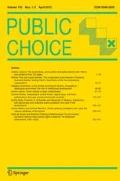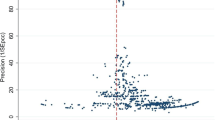Abstract
This paper assesses the relationship between the impact of corruption on growth and investment and the quality of governance in a sample of 63 to 71 countries between 1970 and 1998. Like previous studies, we find a negative effect of corruption on both growth and investment. Unlike previous studies, we find that corruption has a negative impact on growth independently from its impact on investment. These impacts are, however, different depending on the quality of governance. They tend to worsen when indicators of the quality of governance deteriorate. This supports the “sand the wheels” view on corruption and contradicts the “grease the wheels” view, which postulates that corruption may help compensate bad governance.
Similar content being viewed by others
References
Ades, A. and Di Tella, R. (1997). The new economics of corruption: A survey and some new results. Political Studies 45: 496–515.
Bailey, D.H. (1966). The effects of corruption in a developing nation. Western Political Quarterly 19: 719–732. Reprint in A.J. Heidenheimer, M. Johnston and V.T. LeVine (Eds.), Political corruption: A handbook, 934–952 (1989). Oxford: Transaction Books.
Bardhan, P. (1997). Corruption and development: A review of issues. Journal of Economic Literature 35: 1320–1346.
Barro, R.J. (1991). Economic growth in a cross section of countries. Quarterly Journal of Economics 106: 407–443.
Beck, P.J. and Maher, M.W. (1986). A comparison of bribery and bidding in thin markets. Economics Letters 20: 1–5.
Benhabib, J. and Spiegel, M. (2002). Human capital and technology diffusion. Mimeo.
Benhabib, J. and Spiegel, M. (1994). The role of human capital in economic development: Evidence from aggregate cross-country data. Journal of Monetary Economics 34: 143–173.
Brunetti, A. (1997). Political variables in cross-country growth analysis. Journal of Economic Survey 11: 163–190.
Brunetti, A. and Weder, B. (1998). Investment and institutional uncertainty: A comparative study of different uncertainty measures. Weltwirtschaftliches Archiv 134: 513–533.
Campos, J.E., Lien, D. and Pradhan, S. (1999). The impact of corruption on investment: Predictability matters. World Development 27: 1059–1067.
Easterly, W., Kremer, M., Pritchett, L. and Summers, L. (1993). Good policy or good luck? Country growth performance and temporary shocks, Journal of Monetary Economics 32: 459–483.
Huntington, S.P. (1968). Political order in changing societies. New Haven: Yale University Press.
Jain, A.K. (2001). Corruption: A review. Journal of Economic Surveys 15: 71–121.
Johnson, S., Kaufmann, D. and Zoido-Lobaton, P. (1998). Regulatory discretion and the unofficial economy. American Economic Review 88: 387–392.
Kaufmann, D. and Wei, S.-J. (2000). Does ‘grease money’ speed up the wheels of commerce? International Monetary Fund Policy Working Paper, WP/00/64.
Kaufmann, D., Kraay, A. and Zoido-Lobaton, P. (1999). Aggregating governance indicators. World Bank, Working Paper, # 2195, 1999a. Governance matters, World Bank, Working Paper, # 2196, 1999b.
Kormendi, R.C. and Meguire, P.G. (1985). Macroeconomic determinants of growth: Cross-country evidence. Journal of Monetary Economics 16: 141–163.
Kurer, O. (1993). Clientelism, corruption and the allocation of resources. Public Choice 77: 259–273.
Lambsdorff, J.G. (1999). The transparency international corruption perceptions index 1999. Framework Document, Transparency International web site, October 1999. Corruption in empirical research–a review, 9th International Anti-corruption Conference, Durban, 10–15 December.
Lambsdorff, J.G. (2003). How corruption affects persistent capital flows. Economics of Governance 4: 229–243.
Leff, N.H. (1964). Economic development through bureaucratic corruption. American Behavioral Scientist 8: 8–14. Reprint in A.J. Heidenheimer, M. Johnston and V.T. LeVine (Eds.), Political corruption: A handbook, 389–403, 1989. Oxford, Transaction Books.
Levine, R. and Renelt, D. (1992). A sensitivity analysis of cross-country growth regressions. American Economic Review 82: 942–963.
Leys, C. (1965). What is the problem about corruption? Journal of Modern African Studies 3: 215–230. Reprint in A.J. Heidenheimer, M. Johnston and V.T. LeVine (Eds.), Political corruption: A handbook, 51–66, 1989. Oxford: Transaction Books.
Lien, D.H.D. (1986). A note on competitive bribery games. Economics Letters 22: 337–341.
Lui, F.T. (1985). An equilibrium queuing model of bribery. Journal of Political Economy 93: 760–781.
Mankiw, N.G., Romer, D. and Weil, D.N. (1992). A contribution to the empirics of economic growth. Quarterly Journal of Economics 107: 407–437.
Mankiw, G. and Whinston, M. (1986). Free entry and social inefficiency. Rand Journal of Economics 17: 48–58.
Mauro, P. (1995). Corruption and growth. Quarterly Journal of Economics 110: 681–712.
Mauro, P. (1998). Corruption and the composition of government expenditure. Journal of Public Economics 69: 263–279.
Mo, P.H. (2001). Corruption and economic growth. Journal of Comparative Economics 29: 66–79.
Myrdal, G. (1968). Asian drama: An enquiry into the poverty of nations, vol 2. New York: The Twentieth Century Fund. Reprint in A.J. Heidenheimer, M. Johnston and V.T. LeVine (Eds.), Political corruption: A handbook, 953–961, 1989. Oxford: Transaction Books.
Nye, N.S. (1967). Corruption and political development: A cost-benefit analysis. American Political Science Review 61: 417–427. Reprint in A.J. Heidenheimer, M. Johnston and V.T. LeVine (Eds.), Political corruption: A handbook, 963–984, 1989. Oxford, Transaction Books.
Paldam, M. (2002). The cross-country pattern of corruption: Economics, culture and the seesaw dynamics. European Journal of Political Economy 18: 215–240.
Rose-Ackerman, R. (1997). The political economy of corruption. In K.A. Elliott (Ed.), Corruption and the global economy, 31–60. Washington DC: Institute for International Economics.
Shleifer, A. and Vishny, R.W. (1993). Corruption. Quarterly Journal of Economics 108: 599–617.
Tanzi, V. and Davoodi, H. (1997). Corruption, public investment, and growth. International Monetary Fund Working Paper: WP/97/139.
Wei, S.-J. (2000). Local corruption and global capital flows. Brookings Papers on Economic Activity 2: 303–346.
Author information
Authors and Affiliations
Corresponding author
Additional information
We thank an anonymous referee for very helpful comments, which substantially improved the paper. We also benefited from very useful discussions with participants to the “Institutions, growth and development” conference in Perpignan, 2003, and the 2003 Annual Meeting of the European Public Choice Society, in Aarhus, and with seminar participants at the University Robert Schuman of Strasbourg and the University Louis Pasteur of Strasbourg. We acknowledge financial support from the Research Fund at the ULB.
Rights and permissions
About this article
Cite this article
Méon, PG., Sekkat, K. Does corruption grease or sand the wheels of growth?. Public Choice 122, 69–97 (2005). https://doi.org/10.1007/s11127-005-3988-0
Accepted:
Issue Date:
DOI: https://doi.org/10.1007/s11127-005-3988-0



